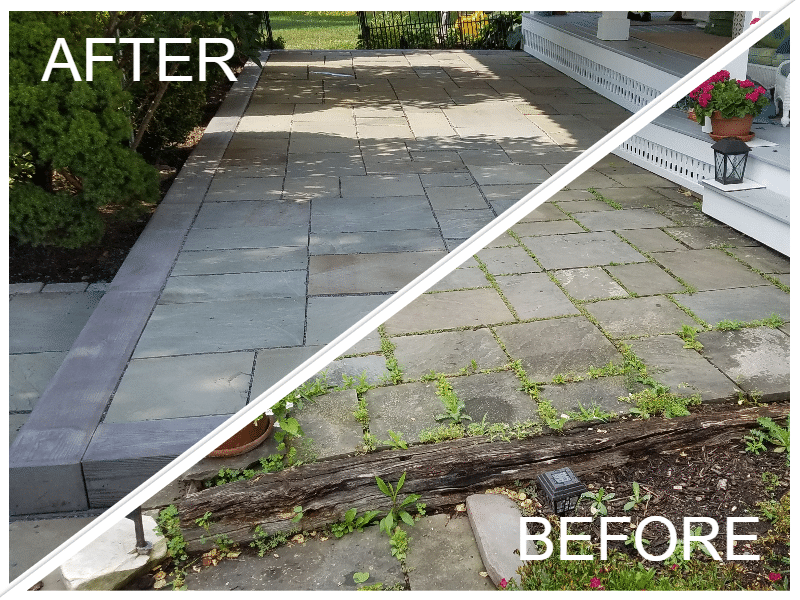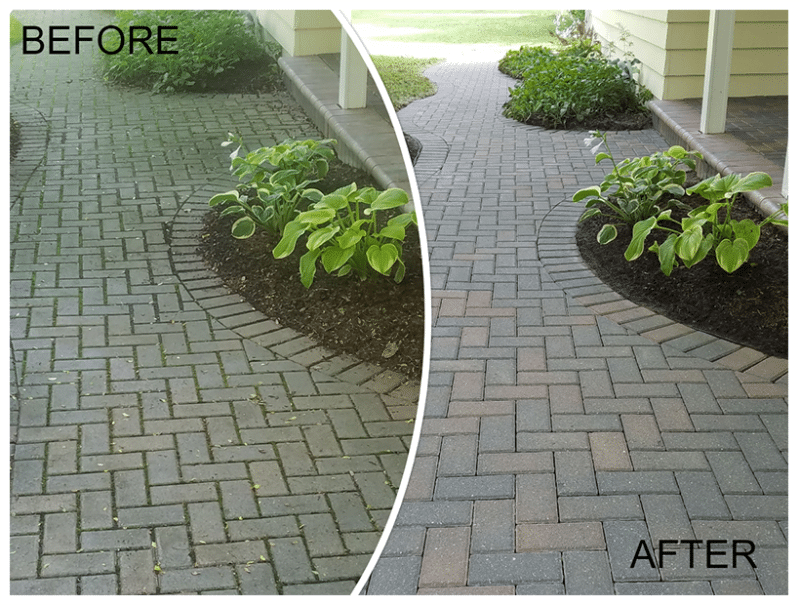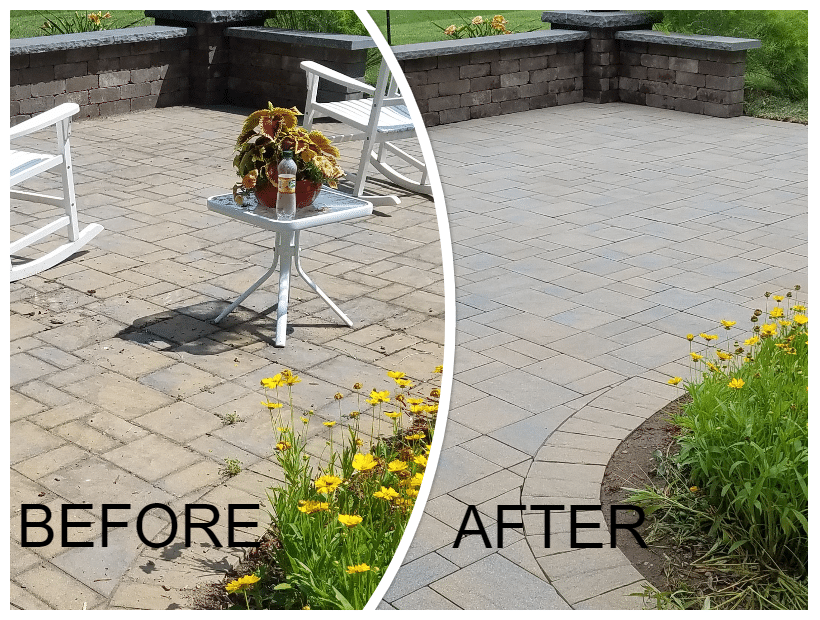Paver Restoration
Paver restoration is a multi-step approach to reviving your existing paver patio, paver sidewalk, or paver driveway. If you are considering replacing your existing paver project, you should first contact us to see if your job is a good candidate for paver restoration. We break down the steps to paver restoration below.
- Repair -
Many concrete pavers that are installed are either installed improperly or use the wrong materials. As a result, this may cause issues that are seen as “typical” with concrete or clay pavers such as weedy joints, or visible edge restraints. Elegant Estates has ICPI certified installers that handle our paver repair requests. Becoming certified through ICPI requires a hands-on experience of 10,000 square feet as well as classroom instruction time and testing. Therefore, our installers are trained to forensically analyze your failing project and suggest the appropriate repairs. We take your paver project very seriously and treat it as if it was our own. All paver repairs needed are identified and rectified prior to proceeding to the next step - cleaning.
We also have NCMA certified installers on staff who specialize in the installation and maintenance of reinforced retaining walls. Many walls that are failing require major repair work, or even replacement. Therefore, it is important that you research your contractor thoroughly prior to any installation in order to verify that they are qualified to install your wall. This will ensure that your wall will stand the test of time. Proper repair of your hardscape requires a technician that understands the science of paver installation completely.
- Clean -
Once your hardscape is repaired, it is time for cleaning. Our cleaning process allows us to use hot water to clean your pavers (if needed) and provide a deep clean that achieves many benefits.
The following benefits of hot water cleaning are:
- Deep cleaning without damaging your pavers (as can be the case with high-pressure cold water washers)
- Sanitation of the surface
- Mold and mildew removal
- Removal of joint material (many of the polymeric sands on the market today require hot water in excess of 180 degrees Fareheit in order to remove)
- Emulsification of any weeds or moss present in the joints or on the surface of the pavers.
Hot water cleaning provides a super clean surface that is ready for the next step - completing the restoration process by joint sanding.
- Restore -
Now that your pavers are squeaky clean, it is time to dry them and reinstate new joint material. We recommend using high-quality polymeric sand to re-sand the joints and complete the interlock process. Many contractors look to cut costs by installing mason sand in the joints. This sand is straight from a local quarry and can be acquired inexpensively. However, this can be problematic since it leaves the joints vulnerable to weed and insect intrusion almost immediately. Polymeric sands, on the other hand, are angular sands which are engineered to provide flexibility of the pavement system when wet while also providing a hard, mortar-like joint when dry. Although polymeric sand is considerably more expensive than quarry sand, it is a mandatory requirement when installing a lasting project. You can learn more about polymeric sand at Get Property Smart! This stage leads us to the final and optional step in the process - Sealing.
- Seal -
Sealing can be a very beneficial service provided to your concrete pavers. Sealers are designed to protect the surface of your pavement as well as the joints between your pavers. There are many different concrete paver sealers on the market today and not all are created equal. One type of sealer that can be installed is “invisible”, or appear as if your pavement has nothing applied to it at all. The second type of paver sealer is an enhancing sealer which can help to bring out the natural beauty of your pavers and make the pavement appear as if it is permanently wet.
We also offer a product that is very effective in sealing your poured concrete as well as your interior and exterior veneer and tile and grout. If you haven’t sealed your interior tile and grout within the past two years, it is time to give us a call! Tile grout can act as a sponge and in areas such as bathrooms that are not sealed and prone to a lot of water exposure, it can spell disaster for your subfloors! Sealing also has the added benefit of allowing future cleaning to be easier and less costly when we come back out to wash your project.
We service a variety of projects in the finger lakes of Central New York. We typically service the cities and towns of Ithaca, Lansing, Cortland, Auburn, and Skaneateles. Depending on the scope of your project, we can mobilize our equipment up to a 100-mile radius of our office in North Lansing, NY. Please refer to our package pricing below for more details on what your project may cost to restore.
- Our Equipment -
Paver restoration can be challenging. It requires a great deal of installation knowledge to know why the project failed, as well as high tech equipment that will deliver high-quality results. In this video below we do a walk around of our wash rig that allows what we do to stand out from our competitors.
- See A Project In Action -
Click on the video below to see what goes into a basic paver restoration project. We would love to speak with you and see how we can breathe new life into that old patio!





